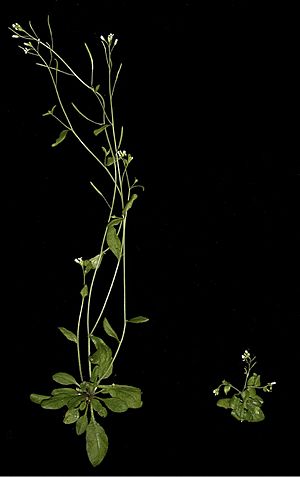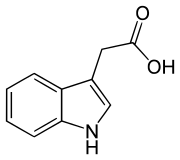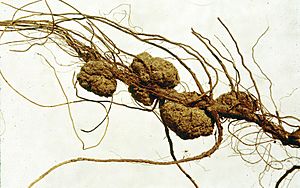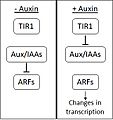Auxin facts for kids
Auxins are special chemicals, like tiny messengers, found in plants. They are a type of plant hormone that helps control how plants grow and develop. Think of them as the plant's own growth managers! Auxins play a super important role in almost every part of a plant's life, making sure it grows correctly from a tiny seed to a big plant.
The first person to really understand auxins and what they do was a Dutch scientist named Frits Warmolt Went. Later, another scientist, Kenneth V. Thimann, was able to find out the exact chemical structure of the most common auxin, which is called indole-3-acetic acid (IAA). Went and Thimann even wrote a book together about plant hormones back in 1937!
Some auxins are made naturally by plants (these are called "native auxins"), but there are also man-made ones called "synthetic auxins." If you use a lot of synthetic auxins, they can actually act like herbicides, which are chemicals used to stop unwanted plants (weeds) from growing. For example, a mixture of synthetic auxins was part of something called Agent Orange, which was used to clear forests.
Contents
How Auxins Help Plants Grow
Auxins are involved in many amazing things plants do. They help plants grow taller, make new roots, and even help them bend towards light.
Growing Towards Light
One cool thing auxins do is help plants bend towards light. This is called phototropism. When light shines on a plant from one side, the auxins move to the shaded side. On the shaded side, auxins make the cells grow longer. This causes the plant stem to bend towards the light, helping the plant get more sunlight for photosynthesis.
Rooting and Branching
Auxins are also very important for roots. They help new roots grow from stems, which is why gardeners sometimes use rooting powders (which contain synthetic auxins) to help plant cuttings grow roots. Auxins also control how many branches a plant has. They usually stop side branches from growing too much, making the main stem grow taller.
Plant Development
Auxins are essential for the overall development of a plant. They help in the formation of leaves, flowers, and fruits. They also play a role in how cells divide and become different parts of the plant, like roots, stems, or leaves.
Auxins and Plant Problems
Sometimes, things can go wrong with auxin levels in plants.
Plant Tumors
Certain bacteria, like Agrobacterium tumefaciens, can infect plants. These bacteria make their own auxins and other plant hormones. When they do this, it messes up the plant's normal cell growth and can cause big, lumpy growths called crown galls or plant tumors.

Images for kids
See also
 In Spanish: Auxinas para niños
In Spanish: Auxinas para niños
 | Shirley Ann Jackson |
 | Garett Morgan |
 | J. Ernest Wilkins Jr. |
 | Elijah McCoy |








